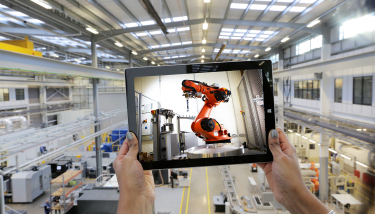10 ways automation could boost your business
Clive Hickman, chief executive of the Manufacturing Technology Centre (MTC), and Jeremy Hadall, chief technologist of the MTC, outline the business changes they expect to see over the next five years as a result of automation.
1. Productivity will increase
Think about the introduction of robots to a car production line. Volkswagen has gone from around 4,000 people working in this environment to nearer 150, while at the same time increasing overall employee numbers from 30,000 to 70,000 across the business.
Business Impact: Improved productivity is good news, as businesses will get more bang for their buck. When you become more productive, you create more demand, and therefore more jobs. More jobs could also mean a higher skill level of employee.
2. Workers will be safer and happier
We strongly disagree that people will be replaced by automation. Yes, people will be redistributed, but this will be one of the most important benefits automation brings. Wherever there exists a dirty, dull and dangerous job with humans exposed to risk, there exists the perfect opportunity for automation.
Business Impact: Workers’ quality of life could be drastically improved as well as allowing them to move into a more highly skilled role including operating the robot. For businesses, this means a workforce with improved prospects, better morale, and a higher skill level.
3. Customer service will reach new heights
Ocado is one of the best examples of how customers can benefit from a business adopting automation. To a large extent, they are only able to fulfil their promise of the faster delivery times that you and I have come to expect because so many of their processes are automated.
Business Impact: Automation can be an invaluable tool for cutting down on errors, facilitating faster deliveries, and for speeding up processes such as restocking. All these contribute to a company’s ability to improve service and deliver exactly what their customers want.
4. Supply chains will need to keep up
The way companies manage their supply chains will evolve. From a logistical point of view, automation could mean that fleets are autonomous in the near future, which will cause a huge shift in distribution and lead times: imagine vehicles which can be on the road 24/7.
Business Impact: After considering the investment required, businesses will need to contemplate how automated factories and warehouses will physically interact with their supply chains – they will require seamless integration from the start of the chain right to the end.
5. Workplaces will be transformed
Robots require much less space than people. They can be built floor-to-ceiling, and can occupy much less hospitable environments than humans can; an unmanned rig in the middle of an ocean, for example.
Business Impact: Linking automation and data together allows us to codify a process which can be implemented anywhere in the world, in smaller, more flexible and collaborative workspaces. This is part of the Fourth Industrial Revolution (4IR), where the process is delivered remotely, but controlled centrally. This will allow the profits to be repatriated to the UK.
6. Public brand perceptions will change
There is an interesting marketing opportunity for businesses who adopt automation before it becomes ubiquitous. The majority of the public have had their perception of automation and robots shaped by sci-fi depictions and the media and there’s still a vague association with an Arnold Schwarzenegger-shaped machine.
Business Impact: The connotation that robots are ‘cool’ could provide a great opportunity for businesses to capitalise on brand perceptions of them being at the forefront of technological advancement. The flipside of this is that businesses who fail to automate could become old-fashioned or obsolete.
7. Internal culture and attitudes will shift
There is a big difference between buying from a company who uses robots, and working alongside one. The fear that workers will be replaced by robots is a sensitive subject, and should be handled tactfully.
Business Impact: For automation to be embraced internally, workers need to understand how it benefits them. Businesses should also review their goals from an ethical standpoint before deciding to automate. The more common it becomes, the more automation will be accepted by consumers and employees alike.
8. IT security concerns will come to the fore
Having fully-automated factories, vehicles, or robots which link to an entire IT system can pose significant security issues for businesses. If a cyber-attacker was able to gain access to even just one robot, it could have potentially catastrophic consequences for any business and its customers.
Business Impact: Before automation can achieve its full potential, it’s crucial that IT systems and defences are robust enough to withstand malicious attacks. In the wake of the recent WannaCry attacks in particular, we expect enhanced IT security to be a high priority.
9. Competitiveness will improve
You can’t compete with low-cost economies on price point using traditional labour intensive technologies. We have to do it through productivity. Automation is one of the most effective ways of increasing our productivity as a nation.
Business Impact: Individual businesses play a vital role in increasing overall productivity and competitiveness by exploring opportunities for automation.
10. Businesses will adopt automation at varying rates, or not at all
How eager a business is to adopt automation will depend on what type of work they do, internal culture, and budgetary considerations. We’ll see early adopters who are technology savvy and those who have to adapt to survive.
Business Impact: How much a business invests in automation will depend largely on its ambitions. There’s no reason smaller companies can’t invest at the same rate as their larger counterparts on a pro rata scale.



